Top Rankings
Lovington School District ranks among the top 20% of public school district in New Mexico for:
Category
Attribute
Community Size
Largest student body (number of students) (Top 1%)
For the 2025 school year, there is 1 public middle school serving 516 students in Lovington School District. This district's average middle testing ranking is 3/10, which is in the bottom 50% of public middle schools in New Mexico.
Public Middle School in Lovington School District have an average math proficiency score of 18% (versus the New Mexico public middle school average of 24%), and reading proficiency score of 28% (versus the 34% statewide average).
Minority enrollment is 84% of the student body (majority Hispanic), which is more than the New Mexico public middle school average of 78% (majority Hispanic).
Overview
This School District
This State (NM)
# Schools
10 Schools
303 Schools
# Students
3,405 Students
97,076 Students
# Teachers
205 Teachers
6,868 Teachers
Student : Teacher Ratio
17:1
17:1
District Rank
Lovington School District, which is ranked within the bottom 50% of all 143 school districts in New Mexico (based off of combined math and reading proficiency testing data) for the 2021-2022 school year.
The school district's graduation rate of 79% has increased from 78% over five school years.
Overall District Rank
#85 out of 144 school districts
(Bottom 50%)
(Bottom 50%)
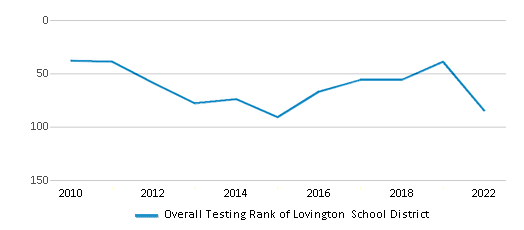
Math Test Scores (% Proficient)
22%
24%
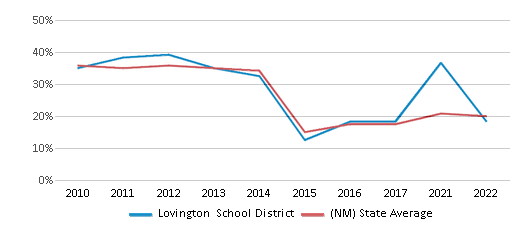
Reading/Language Arts Test Scores (% Proficient)
28%
34%
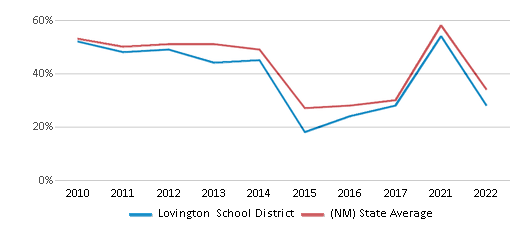
Science Test Scores (% Proficient)
27%
33%
Graduation Rate
(20-21)79%
66%
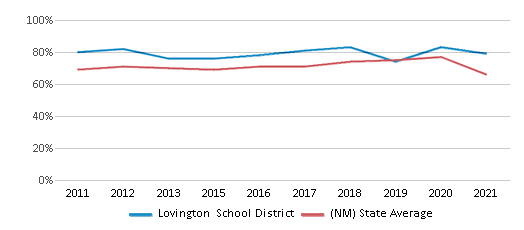
Students by Ethnicity:
Diversity Score
0.30
0.59
# American Indian Students
7 Students
12,899 Students
% American Indian Students
n/a
13%
# Asian Students
14 Students
1,213 Students
% Asian Students
1%
1%
# Hispanic Students
2,794 Students
57,166 Students
% Hispanic Students
82%
59%
# Black Students
46 Students
1,819 Students
% Black Students
1%
2%
# White Students
540 Students
21,565 Students
% White Students
16%
22%
# Hawaiian Students
1 Student
134 Students
% Hawaiian Students
n/a
n/a
# Two or more races Students
3 Students
2,280 Students
% of Two or more races Students
n/a
3%
Students by Grade:
# Students in PK Grade:
157
512
# Students in K Grade:
225
2,239
# Students in 1st Grade:
227
2,451
# Students in 2nd Grade:
219
2,615
# Students in 3rd Grade:
264
2,447
# Students in 4th Grade:
226
2,611
# Students in 5th Grade:
231
2,865
# Students in 6th Grade:
208
17,706
# Students in 7th Grade:
236
23,693
# Students in 8th Grade:
280
24,281
# Students in 9th Grade:
256
4,786
# Students in 10th Grade:
306
4,003
# Students in 11th Grade:
308
3,494
# Students in 12th Grade:
262
3,373
# Ungraded Students:
-
-
District Revenue and Spending
The revenue/student of $14,668 in this school district is less than the state median of $14,756. The school district revenue/student has stayed relatively flat over four school years.
The school district's spending/student of $13,372 is less than the state median of $14,121. The school district spending/student has stayed relatively flat over four school years.
Total Revenue
$50 MM
$4,694 MM
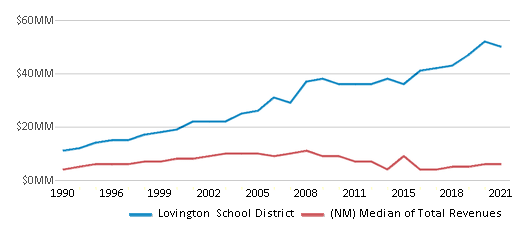
Spending
$46 MM
$4,492 MM
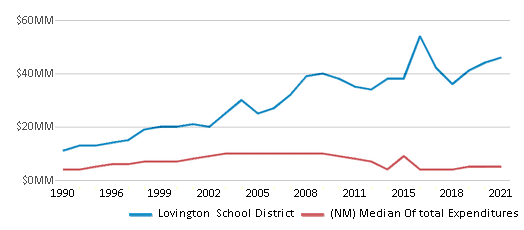
Revenue / Student
$14,668
$14,756
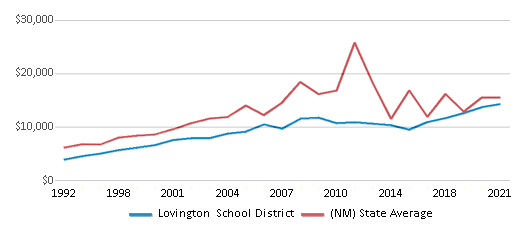
Spending / Student
$13,372
$14,121
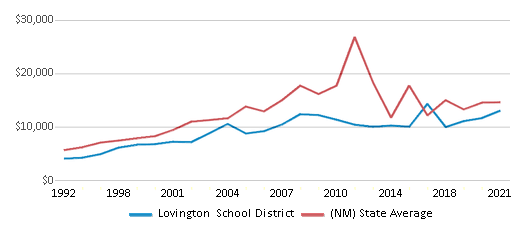
Best Lovington School District Public Middle Schools (2025)
School
(Math and Reading Proficiency)
(Math and Reading Proficiency)
Location
Grades
Students
Rank: #11.
Taylor Middle School
(Math: 18% | Reading: 28%)
Rank:
Rank:
5/
Bottom 50%10
700 South 11th St
Lovington, NM 88260
(575) 739-2435
Lovington, NM 88260
(575) 739-2435
Grades: 7-8
| 516 students
Recent Articles

Year-Round Or Traditional Schedule?
Which is more appropriate for your child? A year-round attendance schedule or traditional schedule? We look at the pros and cons.

Why You Should Encourage Your Child to Join a Sports Team
Participating in team sports has a great many benefits for children, there is no doubt. In this article you will learn what those benefits are.

White Students are Now the Minority in U.S. Public Schools
Increasing birth rates among immigrant families from Asia and Central and South America, combined with lower birth rates among white families, means that for the first time in history, public school students in the United States are majority-minority. This shift in demographics poses difficulties for schools as they work to accommodate children of varying language abilities and socio-economic backgrounds.





